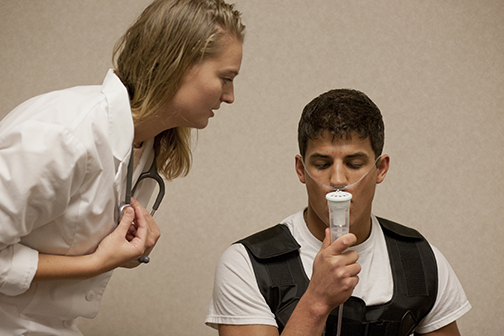Respiratory Care (RC) is an allied health profession that involves the evaluation, treatment, and education of patients with cardiopulmonary (heart-lung) disorders. Respiratory therapists (RTs) work closely with patients, physicians, nurses, and other health care professionals in critical care, emergency rooms, newborn nurseries and pediatrics, medical units, and home care. RTs administer a variety of treatments, gases, and medications to alleviate a patient's breathing problems, manage mechanical ventilators and life support equipment, direct pulmonary rehabilitation activities, perform diagnostic tests that assist physicians to diagnose and monitor lung disease and sleep disorders, and educate patients and their families about their disease process, therapy and wellness. Graduates readily find employment in hospital, clinic, and home care settings throughout the country. Additional career opportunities exist in management, education, sleep centers, research, sales, and public health. According to the U.S. Department of Labor Bureau of Labor Statistics, employment of respiratory therapists is expected to grow faster than the average for all occupations through the year 2026. This increase is attributed to a substantial growth in number of the middle-aged and elderly populations that will increase the incidence of respiratory conditions like chronic obstructive pulmonary disease (COPD) and pneumonia.
A Bachelor of Science degree, Respiratory Care major, from North Dakota State University, includes two to three years of academic courses on campus and a 15-month full-time professional-level internship in the Respiratory Care Department at Sanford Medical Center, Fargo, North Dakota. The NDSU/Sanford Respiratory Care Program is accredited by the Commission on Accreditation for Respiratory Care (CoArc). Graduates are eligible to write the national certifying examinations administered by the National Board of Respiratory Care (NBRC) that lead to the Registered Respiratory Therapist (RRT) credential. NDSU graduates have enjoyed excellent employment opportunities and pass rates on the certifying exams.
Academic courses include chemistry, physics, anatomy and physiology, microbiology, college algebra, psychology, and computer science, in addition to general education courses. The full-time professional internship at Sanford Medical Center Fargo consists of lecture, laboratory, and clinical education onsite at the hospital that prepares the student to enter the profession of respiratory care. Near the end of the internship, students choose a specialty area for a focused clinical experience (RC 494 Individual Study). Common specialty areas include neonatal/pediatric general and intensive care, adult general and intensive care, diagnostics, pulmonary rehabilitation, home care, education, and management.
Qualified students apply for the professional internship during the spring of the academic year they will complete all prerequisite college courses. Applications are available from the Department of Allied Sciences. The application deadline is March 1 annually. Admission is selective and based upon successful completion of all prerequisite courses with a minimum grade of C, cumulative and "core" course grade point averages (a minimum of 2.50 is required; a maximum of core course attempts is two), references, related experience, interview, and compliance with criminal background and student conduct requirements. An admission committee selects the interns. Students admitted to the Respiratory Care internship must possess the ability to complete the entire curriculum which requires the student to meet designated technical standards, or request accommodations to execute these skills. Technical standards include cognitive, physical, motor and tactile abilities, visual acuity, and speaking, hearing, and interactive requirements.
It is highly recommended that students interested in Respiratory Care meet with the RC advisor to discuss degree requirements and internship admission, and create an individualized plan of study at least one year prior to anticipated internship application. Information about the profession, curriculum, internship, technical standards, and advising contacts are available from the Department of Allied Sciences.
Plan of Study
IMPORTANT DISCLAIMER: This guide is not an official curriculum. This guide is a sample four-year degree plan of how students might plan this major with other degree requirements to complete their education in four years.Student plans will vary from this sample due to a variety of factors, such as, but not limited to, start year, education goals, transfer credit, and course availability. To ensure proper degree completion, enrolled students should utilize Degree Map and Schedule Planner in Campus Connection and consult regularly with academic advisors to ensure graduation requirements are being met.

